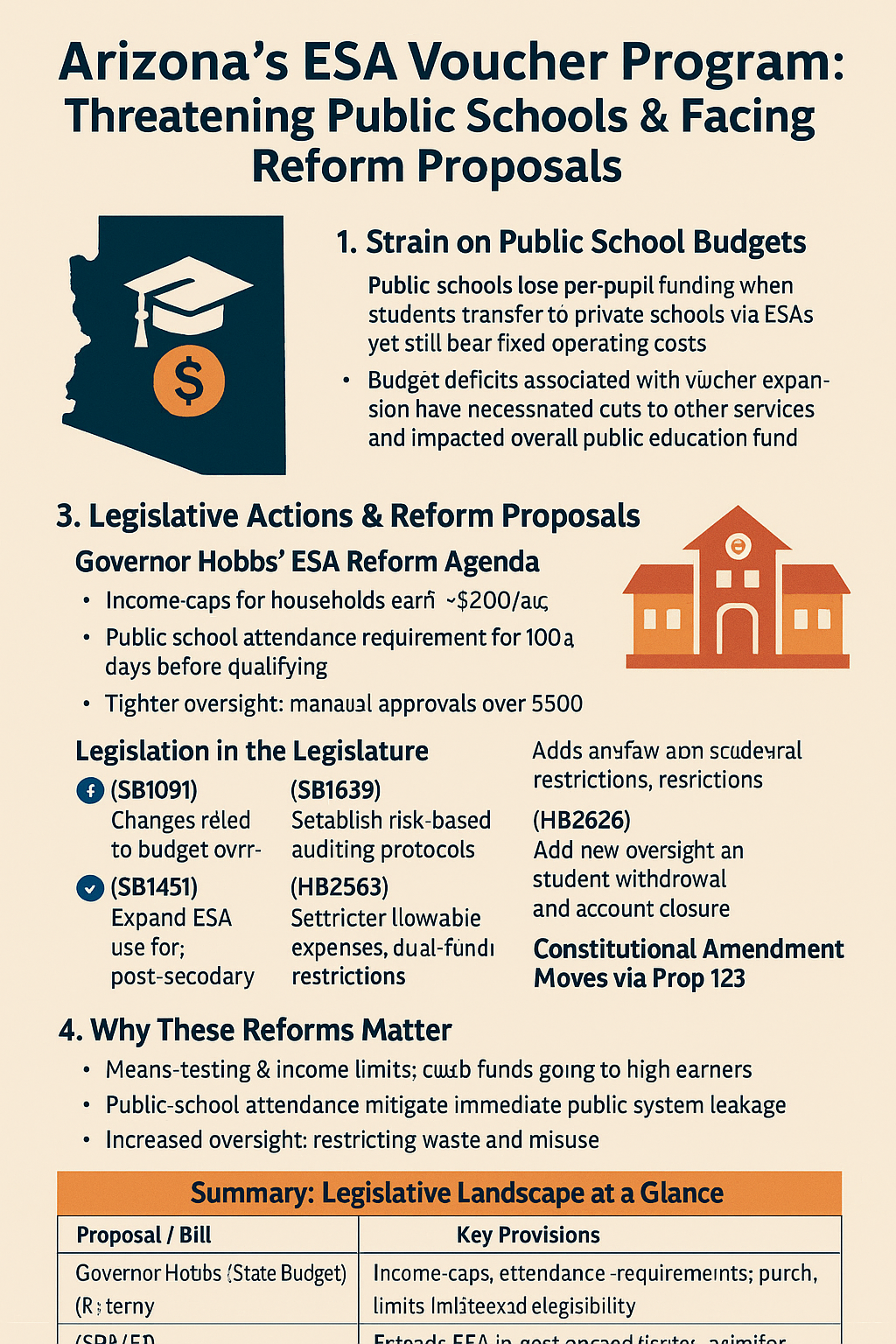Program Overview & Financial Spillover
Arizona’s Empowerment Scholarship Account (ESA) program began in 2011 and expanded in 2022 to serve all K–12 students, leading to explosive growth in enrollment and spending. The program now costs nearly $1 billion annually, far exceeding initial projections and failing to reduce state education spending.
Strain on Public School Budgets
- Public schools lose per-pupil funding when students transfer to private schools via ESAs, yet they still bear fixed operating costs.
- Budget deficits associated with voucher expansion have necessitated cuts to other services and impacted overall public education funding.
Legislative Actions & Reform Proposals
Governor Hobbs’ ESA Reform Agenda
- In her State of the State address (January 13, 2025), Governor Katie Hobbs decried what she called a “billion‑dollar boondoggle” and proposed several reforms:
- Income caps: Full ESA voucher eligibility for households making under ~$100,000; phased reduction and cut off around ~$200,000 and above (Arizona Capitol Times, Axios, Arizona Mirror).
- Public school attendance requirement: Students must attend public school for 100 days before qualifying (KJZZ).
- Tighter oversight: Mandating manual approval of purchases over $500, stricter allowed‑expense lists, and background checks for private school staff (KJZZ).
- Her 2026 budget proposal ($17.7B) includes:
- Income‑tiered ESA award reductions and gradual roll‑back for high‑earning households, expected to save ~$150M (Arizona Mirror).
- Additional proposed public school funding (~$285M), pending renewal of Proposition 123, Arizona’s voter‑approved school funding inflator (Arizona Mirror).
Legislation in the Legislature
- SB1091 (2025) – Changes related to district budget overrides and ballot processes; indirectly touches school finance but not ESA-specific (LegiScan).
- SB1451 – Expands ESA eligibility to post-secondary education expenses, maintains account renewal rules, and strengthens audit/oversight mechanisms (BillTrack50).
- SB1639 – Establishes risk‑based auditing, requires annual renewal for accounts, and clarifies eligibility and enforcement protocols (LegiScan).
- HB2563 (2024) – Defines stricter allowable ESA expenses, prohibits dual receipt of ESA & STO (school tuition organization) funds in the same year, and enforces core subject use and withdrawal from public school enrollment (Arizona Legislature).
- HB2626 – Adds administrative safeguards: annual renewal requirements, restrictions on rebates/refunds, and account closure mechanisms (Arizona Legislature).
Constitutional Amendment Moves via Prop 123
- State Republicans are considering tying ESA protections into the constitutional renewal of Proposition 123 funding, effectively embedding ESA voucher protections into Arizona’s constitution and making future reforms harder (Copper Courier).
Why These Reforms Matter
- Means‑testing & income limits aim to curb funds going to higher-income families, shifting resources toward lower-income students who were underserved by the universal ESA model (Arizona Capitol Times).
- Public‑school attendance requirement helps reduce immediate budget leakage from public education by ensuring students have participated in the system before receiving vouchers.
- Increased oversight—from audits to purchase limits—addresses documented ESA misuse (fraud, luxury expenditures) and improves taxpayer accountability.
- Postsecondary expansions risk diverting more public funds toward private institutions, increasing long-term strain unless carefully regulated.
Summary: Legislative Landscape at a Glance
| Proposal / Bill | Key Provisions | Impact on Public Schools & ESA |
|---|---|---|
| Governor Hobbs (State Budget) | Income caps (full to tiered), 100-day public school attendance, spending oversight limits, purchase reviews | Could reduce ESA misuse, free up funds for public schools, protect low-income eligibility |
| SB1451 | ESA use expanded to college/university tuition/textbooks; annual renewal; audit powers | May extend public funding drain into postsecondary; adds structure but perpetuates diversion |
| SB1639 | Risk-based audits; renewal protocols; enforcement actions | Boosts accountability, reduces fraud risk |
| HB2563 | Restricts dual funding; enforces core subject usage; prohibits rebates | Closes loopholes, strengthens compliance |
| HB2626 | Annual renewal, no rebate clauses, structured account termination rules | Improves fiscal oversight and recoupment |
| Prop 123 constitutional amendments | Embeds ESA protections; shields the program from legislative reform | Undermines future efforts to rein in vouchers and secure public funding |
Why Reform Is Critical — and Why It’s Challenged
Governor Hobbs has repeatedly emphasized ESA’s lack of accountability and disproportionate benefits to wealthy families. But with a Republican-led legislature largely opposed to restricting school choice, most reform proposals face steep political hurdles (Arizona Capitol Times, KJZZ, Axios, AP News, BillTrack50, LegiScan, Copper Courier).
Republican lawmakers continue to champion school choice initiatives and resist reforms tying ESAs to means-testing or attendance requirements. Meanwhile, efforts to constitutionalize ESA protections through Prop 123-related measures raise concerns that future legislative flexibility may be permanently constrained.
Conclusion
As Arizona’s ESA program increasingly diverts state dollars away from public schools—while lacking robust oversight—Governor Hobbs and education advocates are pushing targeted reforms to rein in costs and restore fairness. These include:
- Income‑based eligibility caps to limit payouts for affluent families,
- A 100-day public school attendance rule before voucher qualification,
- Expanded audit and purchase oversight,
- Tighter definitions of eligible expenses, and safeguards against dual-use or misuse.
However, political dynamics in the Legislature, party resistance, and constitutional amendments tied to Proposition 123 may block meaningful changes—potentially locking in the status quo and continuing the strain on public school funding. Unless these bills or reforms gain traction, Arizona’s public education system may face further erosion in both resources and equity.










More Stories
MS-13 Gang Member Who Confessed to 5 Murders Arrested Just Weeks Before Spanberger Ended ICE Cooperation
Suspect Arrested After Deadly Morning Shooting at Phoenix Restaurant Near 27th Ave & Indian School
Person Trapped After Chevy Silverado Flips in Crash; Southbound Traffic Blocked Near Local Church